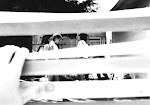A couple of posts back I mentioned The Anti-Romantic Child by Priscilla Gilpin. The reason this book resonated with me so much is that it's partly about what it's like to love books and yet raise a child who, in spite of all encouragement, not much of a reader. My son and I have shared a lot of books, many of them the traditional children's classics, but it's mainly been me reading to him. As much as he loves the books, he'd like to keep it that way. He shows no interest in stretching out and finding his own favorites. Much like his actual diet, his book diet is quite restricted. Hates fantasy. Can't stand the supernatural. When his Reading class last year assigned a book by Mary Downing Hahn (think Lois Duncan for a younger set), he informed me that he liked the book but he didn't believe the ending because "ghosts aren't real." (Something about the solemn way he said that gives me hope for the younger generation.)
Until this summer. For the past few weeks he's been reading, on his own, To Kill A Mockingbird.
It was our idea that he do some reading over the summer, but he picked the book, which he had read excerpts from in his Kumon packets. He raced through the first part of it, swept in by the small-town characters and curiousity over Boo Radley. The second part of the book, about the trial, went a little more slowly. Over and over again I sat down and tried to answer questions -- about black men and white women and lynch law and the way the various characters accomodate the racism around them. Should I see it as a hopeful sign that I had to explain all this as past history? It strikes me that Harper Lee never questioned that this particular context of the novel would be understood. And in spite of all these explanations my son, like Jem, was confident that Tom Robinson would be acquitted. I bit my lip and did my best not to utter any spoilers, but I did hint, "you know, the novel's not really about Tom...it's about Scout and Jem." The next day there was a cry of outrage from his room. He was dancing around in rage, swearing he wasn't going to read any more of the book. When we got him calmed down, he said "But they can appeal to the Supreme Court, right? I think they should appeal to the Supreme Court!"
I don't remember the first time I read To Kill a Mockingbird, though I think I was a teenager. The thing was, I read so much, and so quickly, that it was just another book to me -- a worthy book, but not a real favorite. Going through this experience with my son has given me a different perspective on reading. Instead of being an indiscriminate reader of good, bad and ugly, he reads a little, slowly, but he likes what he reads. And by reading it slowly he lives the book in a way I rarely do. It's given me an appreciation, too, of what works in Mockingbird (and what doesn't -- there are certain parts that make me squirm) and why.
Thursday, August 4, 2011
Subscribe to:
Post Comments (Atom)








3 comments:
This is standard reading in many HS classrooms. I taught it a few years, then you really get in deep into what is happening socially. The characters are brilliant. I often think of my favorite scenes and lines fromt he book. How fascinating to watch your son's reaction to the story.
To be honest, the best part of Mockingbird for me are the characters like Mrs. Dubose (the morphine addict) and the foot-washing Baptists and all the humor Lee gets out of small-town life.
This book seems to be coming up a lot lately, might be time to re-read again. So, awesome you get to share this kind of quality time with your son.
Post a Comment